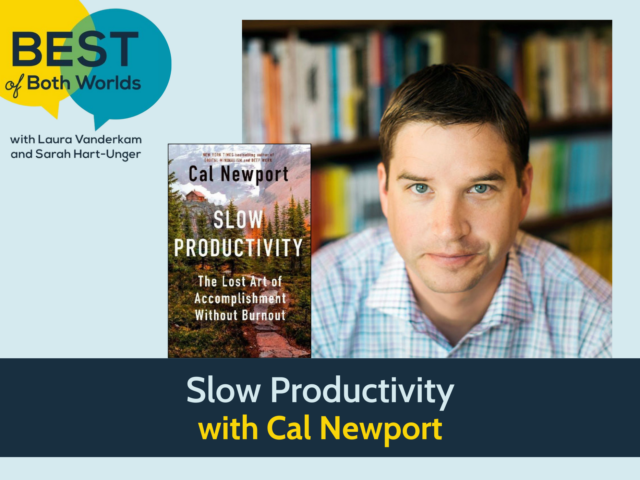Is it possible to get a lot done without exhausting yourself? In today’s episode of Best of Both Worlds, Sarah and I interview Cal Newport about his new book, Slow Productivity, which is all about the “lost art of accomplishment without burnout.”
Cal discusses how his current stage of parenting (three boys, who match up in age with Sarah’s kids) influenced his current thinking. He talks about how to pursue quality without bending into perfectionism, and he chats about his daily schedule, including setting an absolute limit on work time.
In the opening, Sarah and I talk about whether we used planners and time management systems as students. If you’ve long been a productivity devotee, let us know! And check out Slow Productivity wherever books are sold.


Eek, can’t wait to listen! My 3 favorite podcasters all in one episode?! 😍😍
@Kae- we aim to please!
I felt the exact same way! I was super excited to see this title in my podcast player, thank you for getting Cal on! Also, I started using Feedly and it is amazing!
Just finished the book yesterday- perfect timing for this!
This was a really interesting episode. I really think you and Sarah do a better job of addressing “both worlds.” You asked a few different ways, but I still don’t really know how Cal’s household handles like, laundry, dishes, running their home, etc. (the stuff that takes up an inordinate amount of space in my brain ;))
I did appreciate Cal’s shutdown routine/focus on how to be present when it’s family time and I loved his perspective about putting some parameters on endeavors as a way to enforce prioritization.
@Adrienne – Thanks for listening! I’ve spent a lot of time thinking about whether I could simply create a time frame for work (e.g. I only work between 9 and 5) – the problem is I do wind up managing a lot of home stuff during work hours. So I do work stuff during home hours too. It is fine – different people like different separations, but it’s an interesting thought process…
This was so great! You all have such a conversational style. The reminder about a shutdown routine and having thinky hobbies outside of work for high achievers to stop work rumination was really helpful.
There is one bit that I don’t quite agree with when you both pressed him about people with more traditional jobs who don’t have as much power over their workload. We all are pretty far in our careers, but I remember managing a team in my late 20s/early 30s at a nonprofit with leadership that would not listen to my explanations and reports that they could not keep requesting us to make more products and more variations of products without scaling staffing on our team, even while they scaled staff in other areas like upper management and sales. We were just told to be “solutions-oriented” and work “smarter.” Because the staff was mostly either childless people or, in upper management, well-paid married men, the culture was to just work more, which was not sustainable – and lots of folks eventually left because of it. When you’re in that kind of culture, or if you’re in a position where you don’t have a lot of power or think you don’t have a lot of power, and managers don’t listen to your explanation that there is no room for additional tasks, I worry that advice like that kind of puts the blame on the victim a bit? Like “if you have too much on your plate, it’s your own fault.” And it struck me that we are all kind of the same age right now, with similar-ish aged children… it made me think of how you’ve noted before, Laura, that people like to say older kids are harder, but they’re just different – people forget the lack of sleep and the achy back from picking up the kids and the tantrums of the younger years. It can be easier to forget what it’s like in the earlier years of a career, too, when you don’t have the same kind of power.
Thank you for the podcast! Thse are such helpful reminders. Especially that saying yes to one thing means no to another, so take a minute to think. I needed that right now as committee assignments come up!
I guess you could say I’m a long, longtime productivity devotee since the ‘80s when I discovered Alan Lakein’s , Take Control of Your Life and Your Time (his Swiss Cheese method is still one of my favorites ). I was working full time while attending college on the weekend and at night for a Bachelors and then a Masters degree. Productivity and time management methods became a favorite topic for me. I honestly don’t know how I would have accomplished what I did without them. It was an intense time in my life and lasted around fifteen years but I have no regrets. Not only did I get the degrees and a huge bump up in my profession but I never took out a single student loan. And many of the professors I had told our classes that they preferred teaching us because we really wanted to be there unlike the day students who weren’t given a choice.
@Janet- I actually haven’t read Lakein’s work! Something to check out. And yes I imagine teaching working adults has some upsides in that no one is forced to be there — people are making huge sacrifices to go to school, and that no doubt affects how seriously people take things…
Oops…the book is titled “How to Get Control of Your Time and Your Life” and it’s still available on Amazon. Well worth a look. Love your work, too!